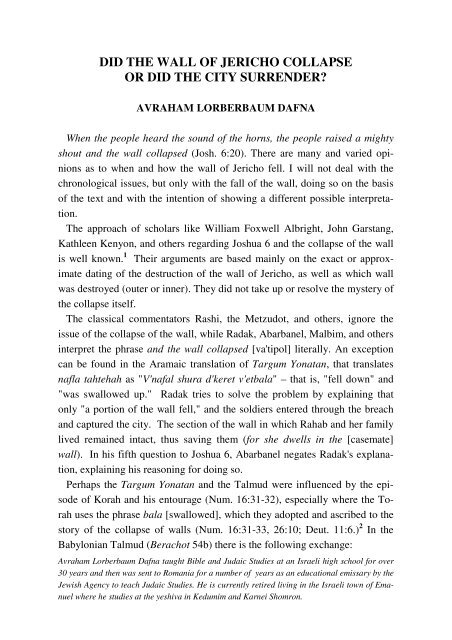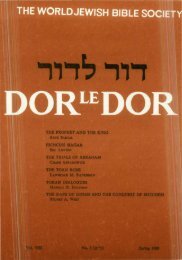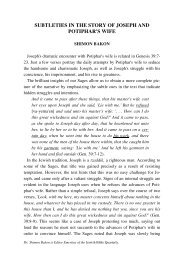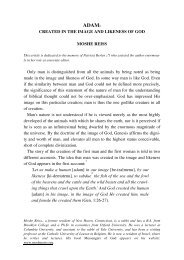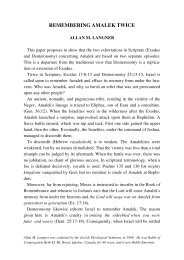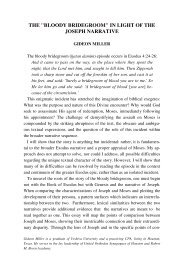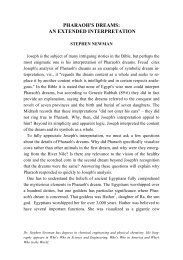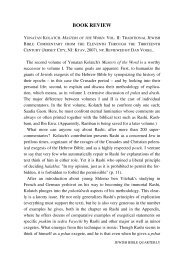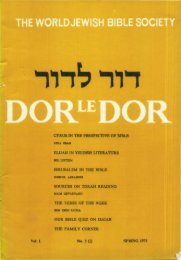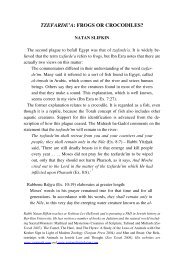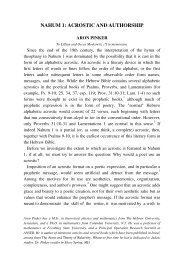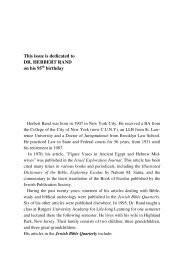did the wall of jericho collapse or did the city surrender?
did the wall of jericho collapse or did the city surrender?
did the wall of jericho collapse or did the city surrender?
Create successful ePaper yourself
Turn your PDF publications into a flip-book with our unique Google optimized e-Paper software.
DID THE WALL OF JERICHO COLLAPSE<br />
OR DID THE CITY SURRENDER?<br />
AVRAHAM LORBERBAUM DAFNA<br />
When <strong>the</strong> people heard <strong>the</strong> sound <strong>of</strong> <strong>the</strong> h<strong>or</strong>ns, <strong>the</strong> people raised a mighty<br />
shout and <strong>the</strong> <strong>wall</strong> <strong>collapse</strong>d (Josh. 6:20). There are many and varied opinions<br />
as to when and how <strong>the</strong> <strong>wall</strong> <strong>of</strong> Jericho fell. I will not deal with <strong>the</strong><br />
chronological issues, but only with <strong>the</strong> fall <strong>of</strong> <strong>the</strong> <strong>wall</strong>, doing so on <strong>the</strong> basis<br />
<strong>of</strong> <strong>the</strong> text and with <strong>the</strong> intention <strong>of</strong> showing a different possible interpretation.<br />
The approach <strong>of</strong> scholars like William Foxwell Albright, John Garstang,<br />
Kathleen Kenyon, and o<strong>the</strong>rs regarding Joshua 6 and <strong>the</strong> <strong>collapse</strong> <strong>of</strong> <strong>the</strong> <strong>wall</strong><br />
is well known. 1 Their arguments are based mainly on <strong>the</strong> exact <strong>or</strong> approximate<br />
dating <strong>of</strong> <strong>the</strong> destruction <strong>of</strong> <strong>the</strong> <strong>wall</strong> <strong>of</strong> Jericho, as well as which <strong>wall</strong><br />
was destroyed (outer <strong>or</strong> inner). They <strong>did</strong> not take up <strong>or</strong> resolve <strong>the</strong> mystery <strong>of</strong><br />
<strong>the</strong> <strong>collapse</strong> itself.<br />
The classical commentat<strong>or</strong>s Rashi, <strong>the</strong> Metzudot, and o<strong>the</strong>rs, ign<strong>or</strong>e <strong>the</strong><br />
issue <strong>of</strong> <strong>the</strong> <strong>collapse</strong> <strong>of</strong> <strong>the</strong> <strong>wall</strong>, while Radak, Abarbanel, Malbim, and o<strong>the</strong>rs<br />
interpret <strong>the</strong> phrase and <strong>the</strong> <strong>wall</strong> <strong>collapse</strong>d [va'tipol] literally. An exception<br />
can be found in <strong>the</strong> Aramaic translation <strong>of</strong> Targum Yonatan, that translates<br />
nafla tahtehah as "V'nafal shura d'keret v'etbala" – that is, "fell down" and<br />
"was s<strong>wall</strong>owed up." Radak tries to solve <strong>the</strong> problem by explaining that<br />
only "a p<strong>or</strong>tion <strong>of</strong> <strong>the</strong> <strong>wall</strong> fell," and <strong>the</strong> soldiers entered through <strong>the</strong> breach<br />
and captured <strong>the</strong> <strong>city</strong>. The section <strong>of</strong> <strong>the</strong> <strong>wall</strong> in which Rahab and her family<br />
lived remained intact, thus saving <strong>the</strong>m (f<strong>or</strong> she dwells in <strong>the</strong> [casemate]<br />
<strong>wall</strong>). In his fifth question to Joshua 6, Abarbanel negates Radak's explanation,<br />
explaining his reasoning f<strong>or</strong> doing so.<br />
Perhaps <strong>the</strong> Targum Yonatan and <strong>the</strong> Talmud were influenced by <strong>the</strong> episode<br />
<strong>of</strong> K<strong>or</strong>ah and his entourage (Num. 16:31-32), especially where <strong>the</strong> T<strong>or</strong>ah<br />
uses <strong>the</strong> phrase bala [s<strong>wall</strong>owed], which <strong>the</strong>y adopted and ascribed to <strong>the</strong><br />
st<strong>or</strong>y <strong>of</strong> <strong>the</strong> <strong>collapse</strong> <strong>of</strong> <strong>wall</strong>s (Num. 16:31-33, 26:10; Deut. 11:6.) 2 In <strong>the</strong><br />
Babylonian Talmud (Berachot 54b) <strong>the</strong>re is <strong>the</strong> following exchange:<br />
Avraham L<strong>or</strong>berbaum Dafna taught Bible and Judaic Studies at an Israeli high school f<strong>or</strong> over<br />
30 years and <strong>the</strong>n was sent to Romania f<strong>or</strong> a number <strong>of</strong> years as an educational emissary by <strong>the</strong><br />
Jewish Agency to teach Judaic Studies. He is currently retired living in <strong>the</strong> Israeli town <strong>of</strong> Emanuel<br />
where he studies at <strong>the</strong> yeshiva in Kedumim and Karnei Shomron.
DID THE WALL OF JERICHO COLLAPSE OR DID THE CITY SURRENDER?<br />
The <strong>wall</strong> <strong>of</strong> Jericho was s<strong>wall</strong>owed up? It fell! – as it is written, And<br />
it came to pass, when <strong>the</strong> people heard <strong>the</strong> sound <strong>of</strong> <strong>the</strong> sh<strong>of</strong>ar, <strong>the</strong><br />
people shouted a mighty shout . . . and <strong>the</strong> <strong>wall</strong> <strong>collapse</strong>d . . . (Josh.<br />
6:20)! [No!] Because it was <strong>the</strong> same height and width, it was s<strong>wall</strong>owed<br />
up. [Since its height and width were <strong>the</strong> same, falling would<br />
have had no effect. Theref<strong>or</strong>e it was s<strong>wall</strong>owed up.]<br />
See also <strong>the</strong> commentary <strong>of</strong> Shlomo Eiger on <strong>the</strong> above, beginning with <strong>the</strong><br />
phrase And <strong>the</strong> <strong>wall</strong>. . . . "This interpretation is tenuous and difficult to accept."<br />
It is clear from <strong>the</strong> above rabbinic sources that <strong>the</strong> <strong>wall</strong> <strong>did</strong> not "<strong>collapse</strong>."<br />
I conclude, ra<strong>the</strong>r, that <strong>the</strong> <strong>wall</strong> around Jericho nei<strong>the</strong>r <strong>collapse</strong>d n<strong>or</strong><br />
was it s<strong>wall</strong>owed up!<br />
Joshua 2 serves as <strong>the</strong> basis f<strong>or</strong> my conclusions. The text is clear that Joshua<br />
sent spies to Jericho to get a feeling f<strong>or</strong> <strong>the</strong> psychological condition <strong>of</strong><br />
<strong>the</strong> people in <strong>the</strong> <strong>city</strong>: And Joshua . . . sent out two men as spies secretly,<br />
saying to <strong>the</strong>m, ‘Go and see <strong>the</strong> land and Jericho . . . (2:1). He said nothing<br />
m<strong>or</strong>e. This should be juxtaposed to <strong>the</strong> st<strong>or</strong>y <strong>of</strong> <strong>the</strong> spies in Numbers 13:18-<br />
25.<br />
While <strong>the</strong> goal in Numbers 13 is a detailed military mission, in Joshua it is<br />
left vague. Note also <strong>the</strong> phrases "to scout" and "and <strong>the</strong>y reconnoitered" in<br />
Numbers 13:17 and 21, as opposed to "go and see" in our st<strong>or</strong>y, indicating<br />
<strong>the</strong> distinctions between <strong>the</strong> goals <strong>of</strong> each <strong>of</strong> <strong>the</strong> spy missions. Also note how<br />
<strong>the</strong>y arrived at <strong>the</strong> <strong>city</strong> at night (Josh. 2:2) and left soon <strong>the</strong>reafter (v. 15)<br />
without coming into contact with any one o<strong>the</strong>r than Rahab. From <strong>the</strong> conversation<br />
between Rahab and <strong>the</strong> men (vv. 9-11), during which only Rahab<br />
speaks while <strong>the</strong> men silently listen to her, it becomes clear that <strong>the</strong> men were<br />
sent to discover <strong>the</strong> psychological state <strong>of</strong> <strong>the</strong> people <strong>of</strong> Jericho. 3<br />
No doubt, Rahab was answering <strong>the</strong> questions posed to her by <strong>the</strong> spies;<br />
questions that <strong>the</strong> edit<strong>or</strong> <strong>of</strong> Joshua chose, f<strong>or</strong> reasons <strong>of</strong> his own, not to include<br />
in <strong>the</strong> text. Rahab only realized <strong>the</strong> identity <strong>of</strong> her guests after <strong>the</strong> messengers<br />
<strong>of</strong> <strong>the</strong> King <strong>of</strong> Jericho pointed out to her that '<strong>the</strong>y have come to<br />
search out <strong>the</strong> land' (v. 3). Knowing who <strong>the</strong>y were, Rahav told <strong>the</strong>m, 'and<br />
all <strong>the</strong> inhabitants <strong>of</strong> <strong>the</strong> land melt away bef<strong>or</strong>e you' (v. 9).<br />
Fur<strong>the</strong>rm<strong>or</strong>e, when Rahab ascends to <strong>the</strong> ro<strong>of</strong> where she has hidden <strong>the</strong><br />
spies, she tells <strong>the</strong>m, 'I know! (v. 9)' – that is: "I know who you are." This is<br />
probably <strong>the</strong> beginning <strong>of</strong> <strong>the</strong> spies' questioning <strong>of</strong> Rahab. We learn from her<br />
Vol. 38, No. 1, 2010<br />
37
38<br />
AVRAHAM LORBERBAUM DAFNA<br />
answers that <strong>the</strong>y are interested in <strong>the</strong> psyche <strong>of</strong> <strong>the</strong> people <strong>of</strong> Jericho. Note<br />
that Rahab does not make a single reference to <strong>the</strong> army and <strong>the</strong> security <strong>of</strong><br />
Jericho. Fur<strong>the</strong>rm<strong>or</strong>e, when <strong>the</strong> spies return to Joshua to relate <strong>the</strong>ir mission,<br />
<strong>the</strong>y say, 'f<strong>or</strong> <strong>the</strong> L<strong>or</strong>d has delivered <strong>the</strong> entire land into our hands . . . and<br />
all <strong>the</strong> inhabitants <strong>of</strong> <strong>the</strong> land melt away bef<strong>or</strong>e us' (v. 24). Note that not<br />
even one significant piece <strong>of</strong> military inf<strong>or</strong>mation is mentioned.<br />
This inf<strong>or</strong>mation given to him prompted Joshua to plan <strong>the</strong> special tactic<br />
that is described in Chapter 6, that is divided into two parts: (1) The plan, as<br />
described by God in verses 3-5, and (2) <strong>the</strong> execution <strong>of</strong> <strong>the</strong> plan in verses 6-<br />
20. The heavenly plan and its implementation was dictated on <strong>the</strong> basis <strong>of</strong> <strong>the</strong><br />
inf<strong>or</strong>mation provided by <strong>the</strong> spies, and was intended to raise <strong>the</strong> tension in<br />
both <strong>the</strong> Israelite camp and among <strong>the</strong> defenders <strong>of</strong> Jericho, bringing <strong>the</strong> tension<br />
to its apex at <strong>the</strong> final moment. Note especially verses 11, 14, and 15,<br />
and <strong>the</strong> culmination in verse 20 on <strong>the</strong> seventh day. After <strong>the</strong> compassing <strong>of</strong><br />
<strong>the</strong> <strong>city</strong> seven times, when <strong>the</strong> entire nation is ready f<strong>or</strong> battle, Joshua still<br />
stretches his own soldiers' nerves, until finally giving <strong>the</strong> final <strong>or</strong>ders to shout<br />
. . . and <strong>the</strong> people shouted (vv. 17-20).<br />
We must imagine <strong>the</strong> scene in verse 20 when <strong>the</strong> entire nation shouted <strong>the</strong><br />
great shout and sounded <strong>the</strong> sh<strong>of</strong>ars. The tension that had mounted up and<br />
overflowed during those seven days and <strong>the</strong> anxiety over what was about to<br />
happen were now to be released. We can only imagine how <strong>the</strong> sounding <strong>of</strong><br />
<strong>the</strong> sh<strong>of</strong>ars affected <strong>the</strong> Canaanite guards on <strong>the</strong> <strong>wall</strong>s <strong>of</strong> <strong>the</strong> <strong>city</strong>. No doubt,<br />
<strong>the</strong>y were taut with tension, fear, and a feeling <strong>of</strong> helplessness during <strong>the</strong><br />
seven days <strong>the</strong> Israelites were marching around <strong>the</strong> <strong>city</strong> with <strong>the</strong> Ark <strong>of</strong> <strong>the</strong><br />
Covenant, without understanding <strong>the</strong> meaning <strong>of</strong> <strong>the</strong> mysterious circling <strong>or</strong><br />
what <strong>the</strong> enemy was really up to. Then came <strong>the</strong> blowing <strong>of</strong> <strong>the</strong> sh<strong>of</strong>ars, 4<br />
intended especially f<strong>or</strong> <strong>the</strong> effect it would have on <strong>the</strong> guards and people <strong>of</strong><br />
Jericho. This effect is echoed by <strong>the</strong> prophet Amos: Can <strong>the</strong> sh<strong>of</strong>ar be blasted<br />
in <strong>the</strong> <strong>city</strong> and <strong>the</strong> people not tremble (Amos 3:6)?<br />
Thus, on <strong>the</strong> seventh day after <strong>the</strong> seventh time around <strong>the</strong> <strong>city</strong> and <strong>the</strong><br />
great noise made by Joshua's soldiers, <strong>the</strong> <strong>wall</strong> <strong>collapse</strong>d. That is: The men<br />
defending <strong>the</strong> <strong>wall</strong> gave up, and that enabled Joshua’s troops to enter <strong>the</strong> <strong>city</strong>.<br />
Meanwhile, <strong>the</strong> guards abandoned <strong>the</strong>ir posts and fled f<strong>or</strong> <strong>the</strong>ir lives. Only<br />
Joshua's troops fought <strong>the</strong> enemy face to face and observed <strong>the</strong> proscription<br />
JEWISH BIBLE QUARTERLY
DID THE WALL OF JERICHO COLLAPSE OR DID THE CITY SURRENDER?<br />
<strong>of</strong> Jericho as he <strong>or</strong>dered (vv. 17-19) as <strong>the</strong>y captured <strong>the</strong> <strong>city</strong> (v. 20), utterly<br />
destroying all that was within <strong>the</strong> <strong>city</strong> . . . by <strong>the</strong> sw<strong>or</strong>d (v. 21).<br />
I believe we must understand <strong>the</strong> issue <strong>of</strong> <strong>the</strong> <strong>wall</strong> <strong>of</strong> Jericho on two planes:<br />
(1) The <strong>surrender</strong>ing <strong>of</strong> <strong>the</strong> <strong>wall</strong> without a fight (as described above), and (2)<br />
<strong>the</strong> conquest <strong>of</strong> <strong>the</strong> <strong>city</strong> in battle. The verb n-f-l has multiple meanings, including<br />
"<strong>surrender</strong>." I have found supp<strong>or</strong>t f<strong>or</strong> <strong>the</strong> interpretation that <strong>the</strong> <strong>collapse</strong><br />
[va-yiplu] <strong>of</strong> <strong>the</strong> <strong>wall</strong> can mean "<strong>surrender</strong>" <strong>or</strong> "capitulation" in <strong>the</strong><br />
Even Shoshan Dictionary, 5<br />
and in <strong>the</strong> following verses:<br />
1. Psalms 45:6: melakhim tahtekha yipolu [kings will fall bef<strong>or</strong>e you]: In<br />
his commentary, Samson Raphael Hirsch interprets this to mean that "Nations<br />
will <strong>surrender</strong> to you."<br />
2. Psalms 18:39-40: I crushed <strong>the</strong>m and <strong>the</strong>y were not able to rise, <strong>the</strong>y fell<br />
[yi-polu] under my feet. You girded me with strength f<strong>or</strong> battle; You caused<br />
my enemy to <strong>surrender</strong> beneath me. The commentary Zimrat Ya states that<br />
verse 40 is a continuation <strong>of</strong> and complementary to verse 39.<br />
3. Jeremiah 52:15: . . . and those that fell away [naflu] to <strong>the</strong> King <strong>of</strong> Babylon.<br />
Rashi in his commentary indicates that <strong>the</strong>se were <strong>the</strong> ones who capitulated<br />
and <strong>surrender</strong>ed.<br />
Fur<strong>the</strong>rm<strong>or</strong>e, if we take <strong>the</strong> verses literally, <strong>the</strong>n <strong>the</strong> <strong>wall</strong> fell by way <strong>of</strong> a<br />
miracle, just as we witnessed miracles in Numbers 16:31-33, 26:10; and Deuteronomy<br />
11:6. 6 One might ask why <strong>the</strong> miracle was delayed f<strong>or</strong> seven days.<br />
Why <strong>the</strong> need f<strong>or</strong> all <strong>the</strong> intricate preparations and <strong>the</strong> tactics that Joshua<br />
used during that week, and all acc<strong>or</strong>ding to <strong>the</strong> w<strong>or</strong>d <strong>of</strong> <strong>the</strong> L<strong>or</strong>d? Could not<br />
<strong>the</strong> miracle have taken place on <strong>the</strong> first day? Why <strong>did</strong> Joshua put it <strong>of</strong>f f<strong>or</strong><br />
seven days? This is tenuous and difficult. (See also <strong>the</strong> Abarbanel’s commentary.)<br />
Finally, we refer to Joshua's curse on Jericho, which was not commanded<br />
by God. 'Cursed be <strong>the</strong> man bef<strong>or</strong>e <strong>the</strong> L<strong>or</strong>d, who rises up and builds this <strong>city</strong><br />
Jericho. . . ' (6:26). No mention is made here <strong>of</strong> <strong>the</strong> <strong>wall</strong> <strong>of</strong> Jericho. Later, in<br />
<strong>the</strong> days <strong>of</strong> Ahab, we read: In his days, Hiel <strong>the</strong> Be<strong>the</strong>lite built Jericho . . . (I<br />
Kgs. 16:34). Here, too, no mention is made <strong>of</strong> <strong>the</strong> <strong>wall</strong> <strong>of</strong> Jericho. It is reasonable<br />
to conclude that <strong>the</strong> building <strong>of</strong> <strong>the</strong> <strong>wall</strong> was not mentioned in Joshua's<br />
oath n<strong>or</strong> <strong>did</strong> Hiel build one, because <strong>the</strong>re was no need to do so. The<br />
<strong>wall</strong> was still standing, because it <strong>did</strong> not <strong>collapse</strong>. Ra<strong>the</strong>r, <strong>the</strong> <strong>city</strong> <strong>surrender</strong>ed.<br />
Vol. 38, No. 1, 2010<br />
39
40<br />
AVRAHAM LORBERBAUM DAFNA<br />
It is clear to this auth<strong>or</strong> (as it was to <strong>the</strong> early commentat<strong>or</strong>s), that this episode<br />
– <strong>the</strong> <strong>surrender</strong> – and <strong>the</strong> st<strong>or</strong>y <strong>of</strong> <strong>the</strong> fall <strong>of</strong> <strong>the</strong> <strong>city</strong> was interpreted by<br />
<strong>the</strong> nation as a "great miracle" (see Num. 26:10). Ins<strong>of</strong>ar as one can refer to<br />
<strong>the</strong> "miracle" <strong>of</strong> <strong>the</strong> <strong>collapse</strong> <strong>of</strong> <strong>the</strong> <strong>wall</strong> as it is related in Joshua 6, one cannot<br />
negate <strong>the</strong> possibility that it is actually a description <strong>of</strong> <strong>the</strong> <strong>surrender</strong> <strong>of</strong><br />
<strong>the</strong> <strong>city</strong>.<br />
NOTES<br />
1. See Yehezkiel Kaufmann, Joshua (Jerusalem: Kiryat Sefer, 1959) pp. 69-71, 115 (Hebrew).<br />
2. In this context one must mention that in <strong>the</strong> episode <strong>of</strong> <strong>the</strong> punishment <strong>of</strong> K<strong>or</strong>ah <strong>the</strong>re is a full<br />
description <strong>of</strong> <strong>the</strong> event that is spread through <strong>the</strong> above sources, describing four steps: (1) <strong>the</strong><br />
land cracked, (2) <strong>the</strong> land opened its mouth; (3).and it s<strong>wall</strong>owed <strong>the</strong>m, (4) and <strong>the</strong> ground covered<br />
<strong>the</strong>m up. On <strong>the</strong> o<strong>the</strong>r hand, in <strong>the</strong> st<strong>or</strong>y <strong>of</strong> <strong>the</strong> <strong>collapse</strong> <strong>of</strong> <strong>the</strong> <strong>wall</strong>, <strong>the</strong> edit<strong>or</strong> is content<br />
with <strong>the</strong> brief phrase and <strong>the</strong> <strong>wall</strong> <strong>collapse</strong>d, in spite <strong>of</strong> <strong>the</strong> fact that <strong>the</strong>re was room f<strong>or</strong> a full and<br />
clear description <strong>of</strong> <strong>the</strong> event. This is tenuous and difficult to accept.<br />
3. Note especially <strong>the</strong> final w<strong>or</strong>ds <strong>of</strong> her speech: '. . . and we heard and our hearts melted, and<br />
no spirit remained in any man to face you'.( 2:11).<br />
4. Compare this to I Samuel 4:4-8.<br />
5. Abraham Even-Shoshan, A New Conc<strong>or</strong>dance <strong>of</strong> <strong>the</strong> Bible: Thesaurus <strong>of</strong> <strong>the</strong> Language <strong>of</strong> <strong>the</strong><br />
Bible, Hebrew and Aramaic, Roots, W<strong>or</strong>ds, Proper Names Phrases and Synonyms (Jerusalem:<br />
Magnes Press, 2000). Under <strong>the</strong> root n-f-l he has "capitulated [k'niya]" (p. 1697) <strong>or</strong> "<strong>surrender</strong>ed<br />
[nikhna l'fanav]" (p. 1699).<br />
6. Come m<strong>or</strong>ning and <strong>the</strong> L<strong>or</strong>d will make known who is His and who is holy. . . (Num. 16:5);<br />
And Moses said to K<strong>or</strong>ah '. . . appear bef<strong>or</strong>e <strong>the</strong> L<strong>or</strong>d, you and <strong>the</strong>y and Aaron' (v. 16); And <strong>the</strong><br />
earth opened its mouth and s<strong>wall</strong>owed <strong>the</strong>m up [vayihiyu laneis] and <strong>the</strong>y became an example<br />
(Num. 26:10). This translation follows <strong>the</strong> Targum and Rashi. However, I prefer to translate this<br />
as "miracle."<br />
JEWISH BIBLE QUARTERLY


